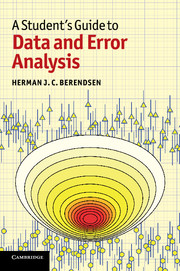Book contents
- Frontmatter
- Contents
- Preface
- Part I Data and error analysis
- 1 Introduction
- 2 The presentation of physical quantities with their inaccuracies
- 3 Errors: classification and propagation
- 4 Probability distributions
- 5 Processing of experimental data
- 6 Graphical handling of data with errors
- 7 Fitting functions to data
- 8 Back to Bayes: knowledge as a probability distribution
- References
- Answers to exercises
- Part II Appendices
- Part III Python codes
- Part IV Scientific data
- Index
3 - Errors: classification and propagation
Published online by Cambridge University Press: 05 June 2012
- Frontmatter
- Contents
- Preface
- Part I Data and error analysis
- 1 Introduction
- 2 The presentation of physical quantities with their inaccuracies
- 3 Errors: classification and propagation
- 4 Probability distributions
- 5 Processing of experimental data
- 6 Graphical handling of data with errors
- 7 Fitting functions to data
- 8 Back to Bayes: knowledge as a probability distribution
- References
- Answers to exercises
- Part II Appendices
- Part III Python codes
- Part IV Scientific data
- Index
Summary
There are errors and uncertainties. The latter are unavoidable; eventually it is the omnipresent thermal noise that causes the results of measurements to be imprecise. After trying to identify and correct avoidable errors, this chapter will concentrate on the propagation and combination of uncertainties in composite functional relations.
Classification of errors
There are several types of error in experimental outcomes:
(i) (accidental, stupid or intended) mistakes
(ii) systematic deviations
(iii) random errors or uncertainties
The first type we shall ignore. Accidental mistakes can be avoided by careful checking and double checking. Stupid mistakes are accidental errors that have been overlooked. Intended mistakes (e.g. selecting data that suit your purpose) purposely mislead the reader and belong to the category of scientific crimes.
Systematic errors
Systematic errors have a non-random character and distort the result of a measurement. They result from erroneous calibration or just from a lack of proper calibration of a measuring instrument, from careless measurements (uncorrected parallax, uncorrected zero-point deviations, time measurements uncorrected for reaction time, etc.), from impurities in materials, or from causes the experimenter is not aware of. The latter are certainly the most dangerous type of error; such errors are likely to show up when results are compared to those of other experimentalists at other laboratories. Therefore independent corroboration of experimental results is required before a critical experiment (e.g. one that overthrows an accepted theory) can be trusted.
Information
- Type
- Chapter
- Information
- A Student's Guide to Data and Error Analysis , pp. 18 - 26Publisher: Cambridge University PressPrint publication year: 2011
Accessibility standard: Unknown
Why this information is here
This section outlines the accessibility features of this content - including support for screen readers, full keyboard navigation and high-contrast display options. This may not be relevant for you.Accessibility Information
- 1
- Cited by
